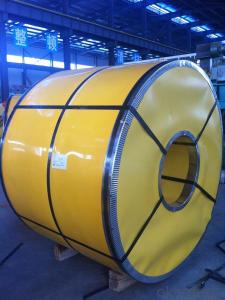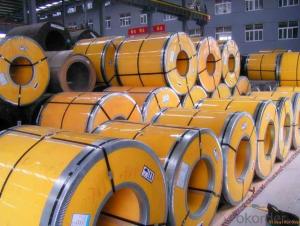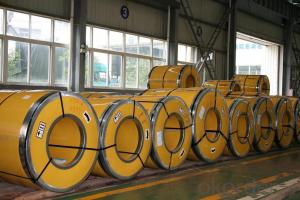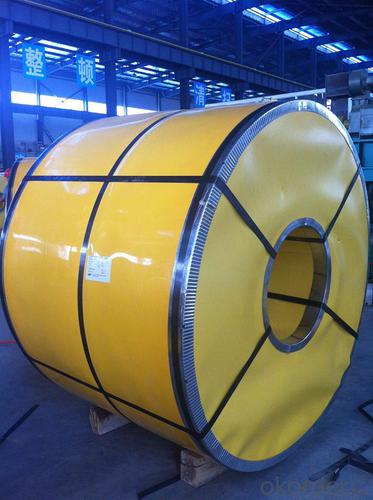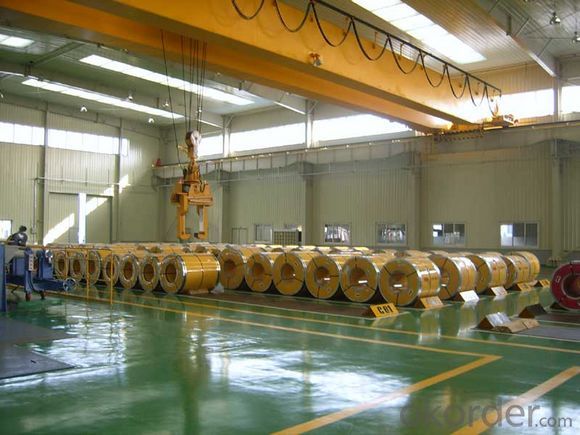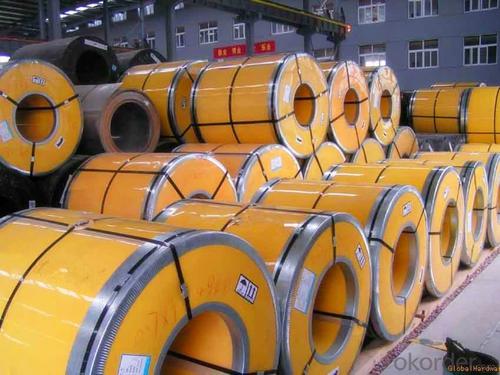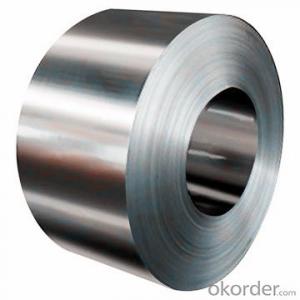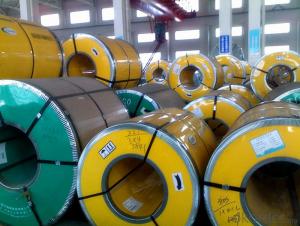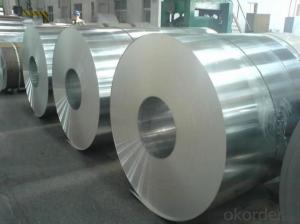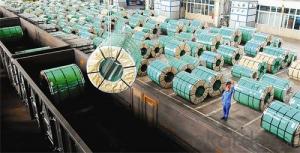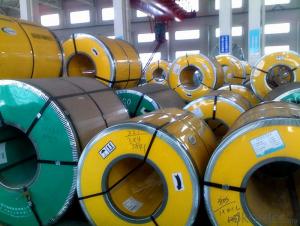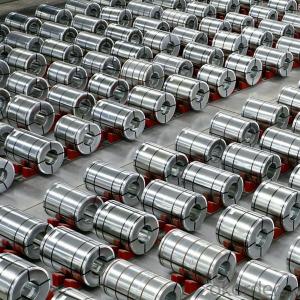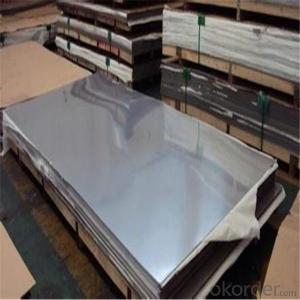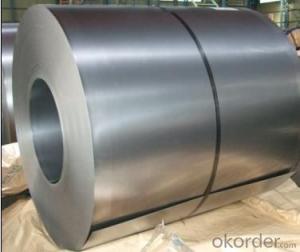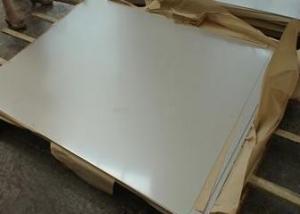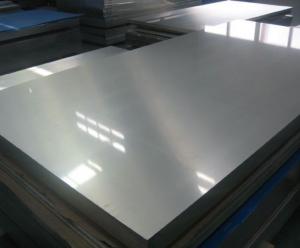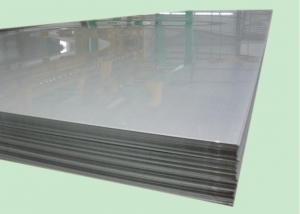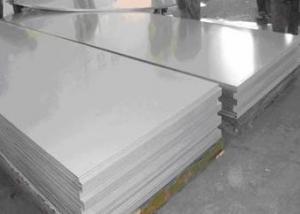Stainless Steel Sheet/ Strip 304 Cold Rolled 2B Finish
- Loading Port:
- Ningbo
- Payment Terms:
- TT OR LC
- Min Order Qty:
- 100 m.t.
- Supply Capability:
- 20000 m.t./month
OKorder Service Pledge
OKorder Financial Service
You Might Also Like
Cold Rolled Stainless Steel Coil 304 Grade 2B Finish
Packaging Detail: standard export packing or as customer's requirements
Delivery Detail: 7-15 days after the order
Standard: | AISI,ASTM,BS,DIN,GB,JIS | Grade: | 304 | Thickness: | 0.3-3.0mm |
Place of Origin: | China Mainland | Brand Name: | CNBM | Model Number: | 304 |
Type: | Steel Coil | Technique: | Cold Rolled | Surface Treatment: | 2B, BA |
Application: | Medical instruments, building, chemical food industry agriculture | Width: | 500-2000mm | Length: | Coil |
finish: | 2B, BA | item: | 304 cold rolled stainless steel coil | density: | 7.93 |
- Q: Are stainless steel strips suitable for dairy equipment?
- Yes, stainless steel strips are suitable for dairy equipment. Stainless steel is a commonly used material in the dairy industry due to its excellent corrosion resistance, hygienic properties, and durability. It is easy to clean, resistant to bacteria growth, and can withstand the harsh conditions typically found in dairy processing. Additionally, stainless steel strips can be easily formed into various shapes and sizes, making them versatile for different dairy equipment applications.
- Q: What are the main stainless steel belt used in the industry and products?
- It is one of the earliest fields of stainless steel application. In architectural decoration, at present, stainless steel is mainly used in high-rise building exterior wall, indoor and external column coating, handrails, floors, elevator panels, doors and windows, curtain walls and other interior decoration and components. After the surface treatment, coloring and coating of the stainless steel plate, the utility model solves the problems such as fingerprint easily appearing after touching, and further expands the application range of the stainless steel.In the home appliance industry, the large quantities of stainless steel are the inner cylinder of the automatic washing machine, the inner liner of the water heater, the inner and outer shell of the microwave oven and the lining of the refrigerator, and the ferritic stainless steel is adopted.
- Q: Can stainless steel strips be used in the food processing conveyors?
- Yes, stainless steel strips can be used in food processing conveyors. Stainless steel is a common material used in the food processing industry due to its corrosion resistance, hygienic properties, and durability. It is suitable for use in conveyors as it can withstand frequent cleaning, exposure to moisture, and high temperatures without degradation or contaminating the food products being processed.
- Q: Can stainless steel strips be used for architectural cladding?
- Indeed, architectural cladding can certainly utilize stainless steel strips. Stainless steel, being a remarkably durable and corrosion-resistant substance, is an outstanding option for external applications like cladding. With its sleek and contemporary aesthetic, stainless steel enhances the overall look of a structure through its reflective qualities. Furthermore, stainless steel strips can be fashioned into an array of sizes, shapes, and finishes, offering limitless design opportunities. Moreover, stainless steel demands minimal upkeep and boasts an extended lifespan, rendering it an economical alternative for architectural cladding.
- Q: Can 111 stainless steel strips be coated with anti-corrosion paints?
- 111 stainless steel strips can indeed be coated with anti-corrosion paints. Stainless steel possesses remarkable resistance to corrosion; nonetheless, there are specific environments or situations where supplementary safeguarding measures may become necessary. Anti-corrosion paints are specifically formulated to furnish an additional shield against corrosion by establishing a barrier between the steel surface and its surrounding environment. The application of these paints can effectively impede rusting, staining, as well as various other forms of corrosion on stainless steel. It is crucial to guarantee the compatibility of the chosen paint with stainless steel and adhere to appropriate application procedures to attain the best possible outcomes.
- Q: What is the yield strength of stainless steel strips?
- The yield strength of stainless steel strips is subject to variation based on the particular grade and thickness of the material. Typically, stainless steel strips exhibit superior yield strength in comparison to alternative steel types owing to their composition, which entails a minimum of 10.5% chromium. Nevertheless, the yield strength can span from approximately 200 megapascals (MPa) for subpar stainless steel strips to more than 1000 MPa for top-notch stainless steel strips. It is imperative to refer to the manufacturer's specifications or conduct material testing in order to ascertain the precise yield strength of a given stainless steel strip.
- Q: Can stainless steel strips be used in the energy sector?
- The energy sector can make use of stainless steel strips. Stainless steel, known for its versatility and durability, offers numerous advantages in energy-related applications. Solar panel manufacturing is one area where stainless steel strips find frequent use. The material's resistance to corrosion, high strength, and ability to withstand extreme weather conditions make it an ideal choice for backing solar panels. This provides structural support and safeguards the solar cells. Stainless steel strips also play a crucial role in wind turbine construction. These strips are employed in the production of various turbine components, including brackets, supports, and frames. Given stainless steel's resistance to corrosion and its high strength-to-weight ratio, it is well-suited to withstand the challenging environmental conditions that wind turbines face. Moreover, stainless steel strips are utilized in the manufacturing of industrial boilers and heat exchangers. These components play a vital role in different energy generation processes, such as those in power plants. Stainless steel's resistance to corrosion, high-temperature resistance, and excellent thermal conductivity make it an appropriate choice for such applications, ensuring long-term performance and efficiency. In conclusion, stainless steel strips are extensively utilized in the energy sector due to their corrosion resistance, strength, and ability to endure extreme conditions. They are commonly employed in solar panels, wind turbines, and industrial boilers, contributing to the efficient and dependable generation of energy.
- Q: Are 111 stainless steel strips suitable for medical equipment?
- 111 stainless steel strips are well-suited for medical equipment. In the medical industry, stainless steel is widely utilized because of its exceptional resistance to corrosion, strength, and durability. The AISI 111 grade, also referred to as 111 stainless steel, is a high-chromium stainless steel with low carbon content, providing commendable resistance to corrosion and remarkable formability. It is frequently employed in the production of medical equipment, such as surgical instruments, orthopedic implants, and dental instruments. Additionally, stainless steel is easily cleaned and sterilized, making it a hygienic option for medical applications. In summary, 111 stainless steel strips are an appropriate material for medical equipment due to their combination of corrosion resistance, formability, and cleanliness.
- Q: Can stainless steel strips be used in textile machinery?
- Yes, stainless steel strips can be used in textile machinery. Stainless steel is a versatile material that offers excellent corrosion resistance, high strength, and durability. These properties make it suitable for various applications in the textile industry, including textile machinery. Stainless steel strips can be used in weaving machines, spinning machines, knitting machines, and other machinery components where strength and resistance to wear and tear are required. Additionally, stainless steel strips are easy to clean and maintain, making them ideal for use in textile machinery that comes into contact with fibers, dyes, and other chemicals.
- Q: Can stainless steel strips be used for wire mesh production?
- Indeed, wire mesh production can utilize stainless steel strips. Renowned for its robustness, longevity, and ability to withstand corrosion, stainless steel is a versatile substance. It can effortlessly be shaped into diverse forms, such as strips, which can subsequently be interwoven or fused to fabricate wire mesh. Given its exceptional mechanical attributes and immunity to rust and corrosion, stainless steel wire mesh finds extensive application in filtration, screening, and fencing. Consequently, stainless steel strips are an appropriate choice for manufacturing wire mesh.
Send your message to us
Stainless Steel Sheet/ Strip 304 Cold Rolled 2B Finish
- Loading Port:
- Ningbo
- Payment Terms:
- TT OR LC
- Min Order Qty:
- 100 m.t.
- Supply Capability:
- 20000 m.t./month
OKorder Service Pledge
OKorder Financial Service
Similar products
Hot products
Hot Searches
Related keywords
